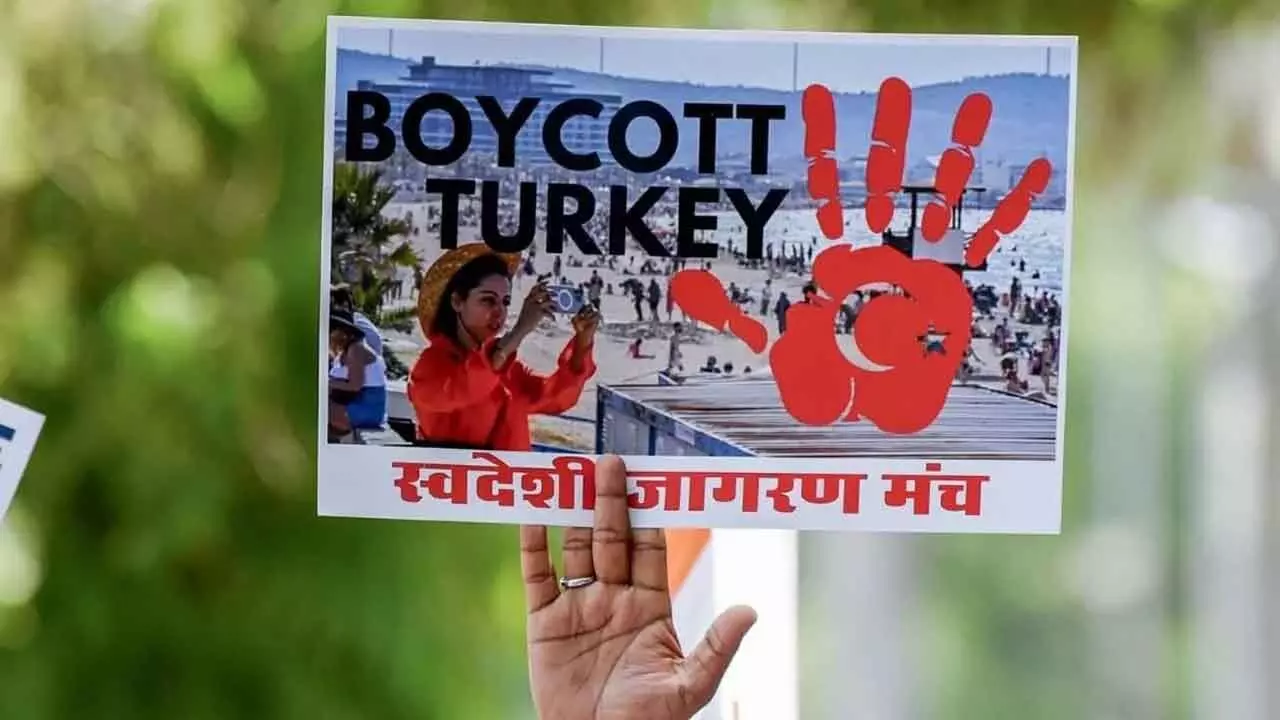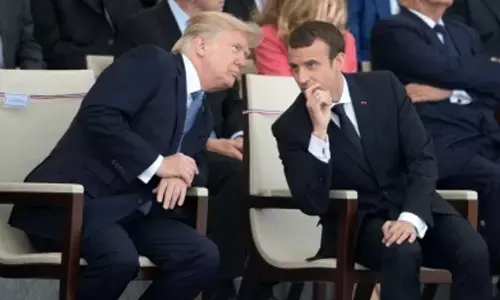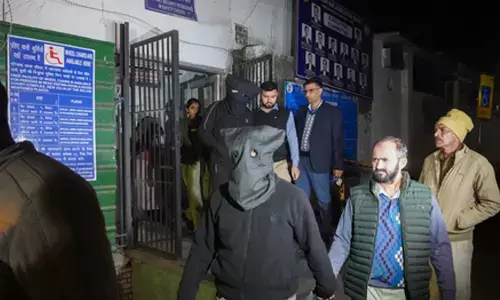Steel in the veins, fire in the skies

India’s red lines have shifted—and Operation Sindoor has made that unmistakably clear. A firm government, battle-ready armed forces, and a citizenry fired by patriotism have dismantled Pakistan’s terror networks and exposed Turkey’s reckless complicity. The strike wasn’t symbolic—it was surgical, sparing civilians while decimating Jaish and Lashkar strongholds. Now, India must stay alert and unforgiving. The ceasefire is not trust—it is tactical. The opposition’s appeasement politics stands disgraced; Agniveers, once mocked, now emerge as India’s frontline heroes. Meanwhile, Turkey must face economic disengagement—its companies, contracts, and commodities have no place in India’s future. Equally, a slumbering southern media must wake up or perish. Journalism must evolve or be buried under irrelevance. No more slogans. No more theatrics. “Nation First, News First” must become a code, not a catchphrase. This is a new India—ruthlessly clear-eyed, globally assertive, and militarily uncompromising.
A firm democratic government, backed by a well-trained, disciplined tri-services command and a citizenry brimming with patriotic fire, has elevated India to the stature of a global superpower. With resolute precision and unflinching resolve, India has laid bare the delusions of Pakistan and exposed the hollow bravado of Turkey—a nation now entangled with our rogue neighbour, whose very identity hinges on fomenting terror and unrest.
As the dust settles on Pakistan’s futile military escalations following the barbaric attack in Pahalgam, let there be no illusion: India must not, and will not, trust either Pakistan or Turkey. The spectre of volatility looms large over our western frontier. Both our political leadership and armed forces must remain ever vigilant, steeled for a long and uneasy watch.
The NDA government, guided by pragmatic realism, must shun complacency and tune out the cacophony of jingoistic distractions hurled by a faltering opposition. A ceasefire may have been inked, but Operation Sindoor has redrawn the contours of Indian tolerance. The message is unequivocal: Pakistan must never be allowed to test these new red lines—not even if global powers like the United States wield the threat of sanctions.
India now stands on the crest of historic momentum.
Our diplomatic and military strides must become an unstoppable surge. Having struck a decisive blow to Pakistan, India must leverage its global influence to ensure institutions like the IMF cease their indulgence of a bankrupt, terror-feeding regime. Pakistan is a financial corpse, borrowing to repay debt—the IMF’s bailout is nothing less than handing dynamite to a delinquent arsonist.
With chilling precision, India’s armed forces obliterated nine terrorist strongholds across Pakistan and PoK. These were not routine strikes: the Jaish-e-Mohammed HQ in Bahawalpur, Lashkar-e-Taiba’s core nodes in Muridke and Sialkot—flattened. Over 100 terrorists, eliminated. Their camps, weapons, and networks—reduced to ash.
Yet caution remains our ally. Pakistan is a master of reinvention. New camps will rise in the shadows, perhaps even on Turkish soil—given Ankara’s startling willingness to host the embers of terror.
Recall how Pakistan violated a ceasefire within 90 minutes of signing it. Let us not forget how Donald Trump falsely claimed credit for brokering peace—only for Pakistan to mock that gesture within the hour. The pattern is as predictable as it is perfidious.
At home, the opposition falters. While the people rise with blazing patriotism, Congress dithers—soon, perhaps, to parrot Pakistan’s plea to restore the Indus Waters Treaty. But as Prime Minister Narendra Modi rightly declared: “Blood and water cannot flow together.”
Predictably, the Congress clutches to the past—invoking the 1971 war, lionising Indira Gandhi. They accuse Modi of lacking courage, of waging war on Pakistan’s people, not terror. But facts remain unmoved by rhetoric.
In 1971, when Pakistan stirred mischief, Indira Gandhi asked General Sam Manekshaw if he could liberate Bangladesh. His reply: only with full autonomy to choose the time. Six months later, victory was ours.
In case of Operation Sindoor, Modi took the initiative and gave full freedom to the armed forces to decide when and how to strike at Pakistan. Modi gave Pakistan 14 days to act. When they failed, he unleashed the tri-services. What followed was swift, surgical, and precise—terror networks were dismantled, civilians spared.
This operation silences critics, especially those who vilified the Agnipath scheme. Let them witness the courage of Agniveers—like M Murali Naik of Andhra Pradesh’s Sri Sathya Sai district, who joined the 851 Light Regiment in 2023. In the heights of Uri, he stood firm against infiltrators—and fell, a martyr for Bharat.
The blood of Agniveers affirms their place in India’s military doctrine. They are not trainees—they are warriors. Their courage is no concept—it is carved into the snowfields of Kashmir.
India remains alert. But the state must act boldly against Turkey. Citizens have already spoken—boycotting Turkish travel despite personal loss. The government must follow. Turkish firms involved in Indian infrastructure must be packed off and their contracts annulled.
Gulemak is building metros in Lucknow, Pune and Surat. Savronik helped build the Atal Tunnel. This contract should also be terminated just as it had done in the case of Çelebi Aviation, which operates ground-handling services in Mumbai, Delhi, Bengaluru, Hyderabad, Ahmedabad, Kannur, Chennai, Goa and Cochin. These are vulnerabilities, not partnerships.
Importers have begun rejecting Turkish marble, stone and apples. The sentiment must now become policy. India’s annual Turkish marble imports—worth ₹1,000 crore—can be replaced by white and beige marble from Italy, Greece, Vietnam—or our own Makrana. We can turn to Iran, the US, Chile, New Zealand—or boost domestic orchards in Himachal, Kashmir, Uttarakhand to increase the production of apples.
As for boron minerals, pumice, feldspar, and bentonite—vital to industry—India can source them from the USA, Argentina, or China. Turkey is not indispensable.
Operation Sindoor should also jolt the media barons of this country into action—especially the regional media, and most glaringly, the southern media—which has grown complacent, outdated, and unwilling to adapt to the fast-changing demands of journalism. For too long, these outlets have operated like relics of the past, refusing to invest in talent, technology, or editorial courage.
It’s time they build sharply committed teams, who understand the power of real-time information, who live and breathe news, and who are willing to put in the hard yards on the ground.
Passionate reporters, not graphics packages, should drive storytelling. Enough of studio theatrics—we need news casters, not teleprompter-reading mannequins. And certainly not anchors who are more concerned with wardrobe styling than with asking hard, uncomfortable questions.
Blindly aping national channels in anchor fashion will not make a channel credible.
Managements must open their wallets and their minds—invest in cutting-edge technology, build strong R&D teams, and ensure regular, rigorous training from the newsroom floor to field reporters. If they can’t do that, they have no business running a media house.
The print media isn’t off the hook either. It must develop deeper political insight and break free from the clutches of pressure and patronage. Following the news till the final hour, rewriting and refining stories with a professional touch—that’s the bare minimum one expects. Journalism is not stenography. Blind dependence on press notes is intellectual laziness and professional suicide.
If the media in this region doesn’t wake up now, it won’t just fall behind—it will become irrelevant. “Nation First, News First” must not be a slogan. It must be a non-negotiable editorial principle. Otherwise, let’s stop pretending we still have journalism here.
(The author is former Chief Editor of Hans India)









